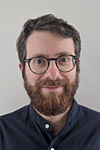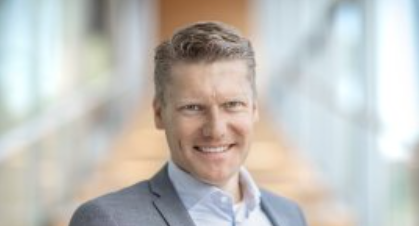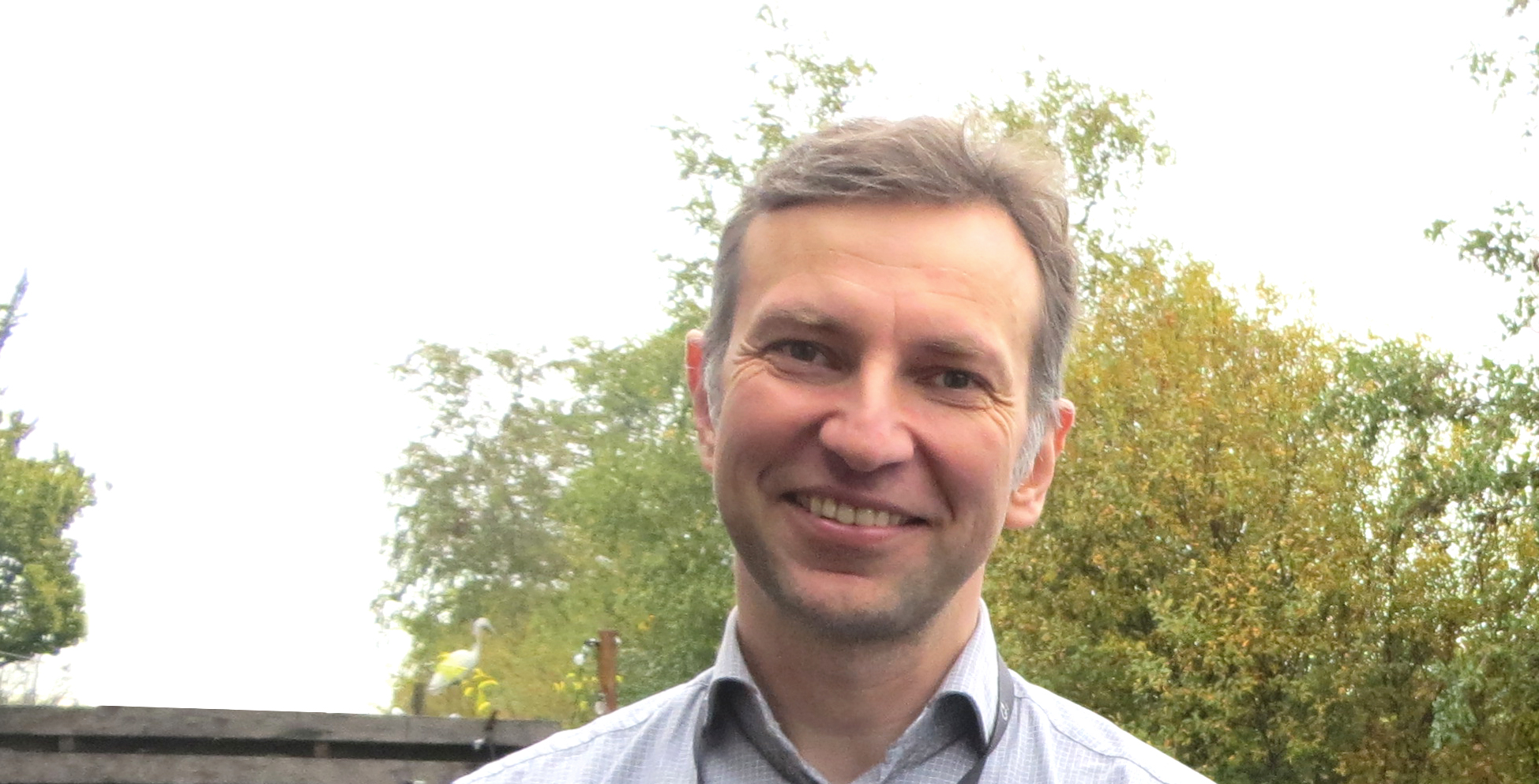CV – Research – Lab members – Publications
 Dr. Florian Berger
Dr. Florian Berger
Cell Biology, Neurobiology and Biophysics
Department of Biology
Faculty of Science, Utrecht University
Kruytgebouw, room N509
Padualaan 8, 3584 CH Utrecht
The Netherlands
Email: f.m.berger@uu.nl
Curriculum Vitae
Florian Berger studied physics at Stuttgart University, Germany, where he investigated stochastic nonequilibrium systems in the research group of Prof. Dr. Seifert. For his Ph.D. work, he joined the Theory and Biosystems Department led by Prof. Dr. Lipowsky at the Max Planck Institute in Potsdam, Germany. Here, he developed a theoretical framework to study the cooperativity of coupled molecular motors, for which he received a Ph.D. in theoretical Physics with the highest honors. To investigate the physiological role of molecular motors as tension regulators on mechanosensitive ion channels in the inner ear, Dr. Berger conducted research in Prof. Dr. Hudspeth’s Laboratory of Sensory Neuroscience at the Rockefeller University, New York, USA. In this lab, he combined theoretical descriptions with experimentations to address problems ranging from nonlinear systems theory in hearing to the cooperative gating of ion channels.
For his postdoctoral research, Dr. Berger received a Feodor Lynen Fellowship from the Alexander von Humboldt Foundation and a Pilot Grant from the Kavli Neural Systems Institute. Since October 2019, he has been the principal investigator of the research group for theoretical biophysics at Utrecht University.
Research summary
All forms of life display a remarkable variety of active processes on different length scales. We develop biophysical descriptions to understand how these active processes mediate the flow of energy and matter to self-organize cellular order and function. These descriptions span a wide range of length scales, from structure-function relations of molecular-motor heads, transport and positioning of organelles, up to the cellular activity of hearing organs. We believe that a mutual stimulation of theoretical considerations and experimental findings is a beautiful way to decipher nature’s fundamental principles.
We apply concepts from stochastic physics and statistical mechanics to understand diverse biological systems. You can find more information about our research at www.biophyslab.com
Lab members
| PhD candidates | |
| Yanathip Thipmaungprom | |
| Kyriacos Nicolaou | |
| Master students | |
| Konstantina Forti | |
| Anna Delhaas |
Find a full list of current and past team members on www.biophyslab.com/team
Publications
For a complete list of publications please visit the google scholar page.
2024
Nagpal S, Swaminathan K, Beaudet D, Verdier M, Wang S, Berger CL, Berger F, Hendricks AG. Optogenetic control of kinesin-1, -2, -3 and dynein reveals their specific roles in vesicular transport. Cell Rep. 2024 Aug 27;43(8):114649. doi: 10.1016/j.celrep.2024.114649. Epub 2024 Aug 18. PMID: 39159044.
Liu X, Rao L, Qiu W, Berger F, Gennerich A. Kinesin-14 HSET and KlpA are non-processive microtubule motors with load-dependent power strokes. Nat Commun. 2024 Aug 3;15(1):6564. doi: 10.1038/s41467-024-50990-x. PMID: 39095439; PMCID: PMC11297315
2022
Tucci G, Roldán É, Gambassi A, Belousov R, Berger F, Alonso RG, Hudspeth AJ. Modeling Active Non-Markovian Oscillations. Phys Rev Lett. 2022 Jul 15;129(3):030603. doi: 10.1103/PhysRevLett.129.030603. PMID: 35905355.
Chen F, Wu J, Iwanski MK, Jurriens D, Sandron A, Pasolli M, Puma G, Kromhout JZ, Yang C, Nijenhuis W, Kapitein LC, Berger F, Akhmanova A. Self-assembly of pericentriolar material in interphase cells lacking centrioles. Elife. 2022 Jul 5;11:e77892. doi: 10.7554/eLife.77892. PMID: 35787744; PMCID: PMC9307276.
Bodzęta A, Berger F, MacGillavry HD. Subsynaptic mobility of presynaptic mGluR types is differentially regulated by intra- and extracellular interactions. Mol Biol Cell. 2022 Jul 1;33(8):ar66. doi: 10.1091/mbc.E21-10-0484. Epub 2022 May 5. PMID: 35511883; PMCID: PMC9635276.
F Berger, AJ Hudspeth, Violation of the fluctuation-response relation from a linear model of hair bundle oscillations, bioRxiv, 2022.04. 15.488459.
2021
Gros OJ, Damstra HGJ, Kapitein LC, Akhmanova A, Berger F. Dynein self-organizes while translocating the centrosome in T-cells. Mol Biol Cell. 2021 Apr 19;32(9):855-868. doi: 10.1091/mbc.E20-10-0668. Epub 2021 Mar 10. PMID: 33689395
2020
Hooikaas PJ, Damstra HG, Gros OJ, van Riel WE, Martin M, Smits YT, van Loosdregt J, Kapitein LC, Berger F, Akhmanova A. Kinesin-4 KIF21B limits microtubule growth to allow rapid centrosome polarization in T cells. Elife. 2020 Dec 21;9:e62876. doi: 10.7554/eLife.62876. PMID: 33346730
Belousov R, Berger F, Hudspeth AJ. Volterra-series approach to stochastic nonlinear dynamics: Linear response of the Van der Pol oscillator driven by white noise. Phys Rev E. 2020 Sep;102(3-1):032209. doi: 10.1103/PhysRevE.102.032209. PMID: 33075951
Brenner S, Berger F, Rao L, Nicholas MP, Gennerich A. Force production of human cytoplasmic dynein is limited by its processivity. Sci Adv. 2020 Apr 8;6(15):eaaz4295. doi: 10.1126/sciadv.aaz4295. PMID: 32285003; PMCID: PMC7141836.
2019
Pohl A, Berger F, Sullan RMA, Valverde-Tercedor C, Freindl K, Spiridis N, Lefèvre CT, Menguy N, Klumpp S, Blank KG, Faivre D. Decoding Biomineralization: Interaction of a Mad10-Derived Peptide with Magnetite Thin Films. Nano Lett. 2019 Nov 13;19(11):8207-8215. doi: 10.1021/acs.nanolett.9b03560. Epub 2019 Oct 7. PMID: 31565946
Rao L, Berger F, Nicholas MP, Gennerich A. Molecular mechanism of cytoplasmic dynein tension sensing. Nat Commun. 2019 Jul 26;10(1):3332. doi: 10.1038/s41467-019-11231-8. PMID: 31350388; PMCID: PMC6659695.
Belousov R, Berger F, Hudspeth AJ. Volterra-series approach to stochastic nonlinear dynamics: The Duffing oscillator driven by white noise. Phys Rev E. 2019 Apr;99(4-1):042204. doi: 10.1103/PhysRevE.99.042204. PMID: 31108618.
Berger F, Klumpp S, Lipowsky R. Force-Dependent Unbinding Rate of Molecular Motors from Stationary Optical Trap Data. Nano Lett. 2019 Apr 10;19(4):2598-2602. doi: 10.1021/acs.nanolett.9b00417. Epub 2019 Mar 13. PMID: 30835477.
2018
AR Chaudhary, L Balabanian, F Berger, CL Berger, AG Hendricks, Microtubule Associated Proteins and Bundling Regulate Kinesin and Dynein Processivity and Force Generation to Direct Intracellular Trafficking, Biophysical Journal 114 (3), 195a-196a
Chaudhary AR, Berger F, Berger CL, Hendricks AG. Tau directs intracellular trafficking by regulating the forces exerted by kinesin and dynein teams. Traffic. 2018 Feb;19(2):111-121. doi: 10.1111/tra.12537. Epub 2017 Dec 5. PMID: 29077261





 Anna Akhmanova:
Cellular Dynamics
Anna Akhmanova:
Cellular Dynamics Lukas Kapitein: Biophysics
Lukas Kapitein: Biophysics Florian Berger:
Theoretical Biophysics
Florian Berger:
Theoretical Biophysics Agathe Chaigne:
Cell division dynamics
Agathe Chaigne:
Cell division dynamics Ginny Farías:
Neuronal Organelle Dynamics
Ginny Farías:
Neuronal Organelle Dynamics Martin Harterink:
C. elegans neurobiology
Martin Harterink:
C. elegans neurobiology Casper Hoogenraad: Molecular Neuroscience
Casper Hoogenraad: Molecular Neuroscience Maarten Kole:
Axonal Signalling
Maarten Kole:
Axonal Signalling Sabrina Oliveira:
Molecular Targeted Therapies
Sabrina Oliveira:
Molecular Targeted Therapies Ihor Smal: Image Analysis, Smart Microscopy and AI
Ihor Smal: Image Analysis, Smart Microscopy and AI Frederik Verweij:
Extracellular Vesicle Biology
Frederik Verweij:
Extracellular Vesicle Biology